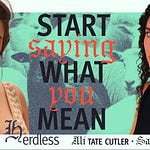When political disagreements become a battle between good and evil instead of a difference of information, there's more at play than just "misinformation."
As humans, we've spent thousands of more years making up stories to explain the world than we have finding facts and rationally discerning reality from fiction. As people become overloaded with information and underprepared to explain the world to themselves, our primitive tool of myth-making is rising to fill the gaps. But unlike with misinformation, a person rarely abandons their myth just because they've seen contradictory facts.
Being a functional individual and creating positive change requires not just a knowledge of reality, but an understanding of how humans have always navigated reality via myths.
In this livestream I'll share some of Joseph Campbell's ideas on the role myth plays in our life and society, as well as how to recognize when you're in the realm of rational truth-seeking vs irrational myth-making. We'll also discuss:
How mythological thinking influences our political beliefs
The dangerous myths driving our culture
Becoming aware of our own myth and consciously altering it
Here’s a preview:
Join my next livestream for a real-time black sheep hangout + discussion on topics like groupthink, the philosophy of individualism, radical self-reliance, and other topics people seeking meaningful lives in modern times need. Stop by via YouTube, Rumble, Instagram, Substack, or X, [almost] every Tuesday, Wednesday, and Friday evening.
If you want a community based on your values, help build it!













